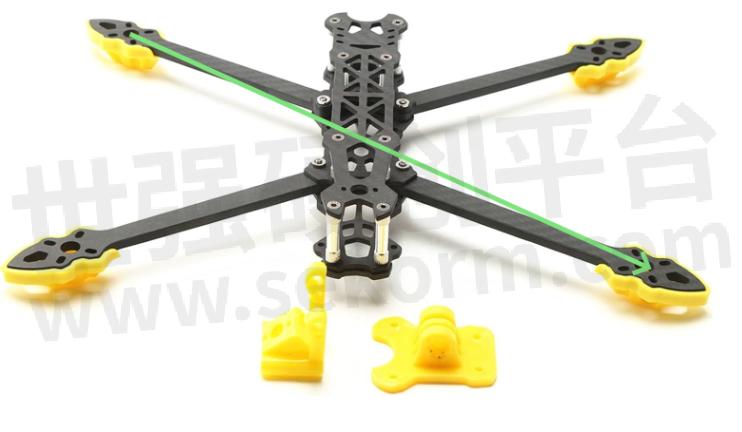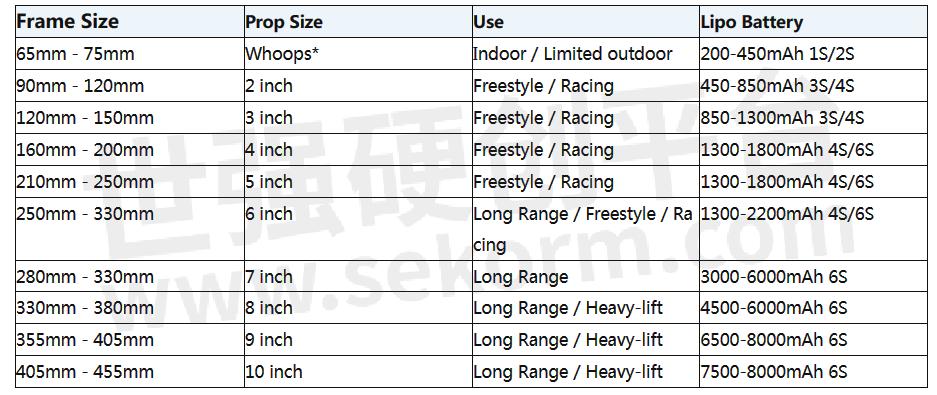What Size FPV Drone Should I Get?




FPV (First Person View) drones come in various sizes, each offering different characteristics and performance capabilities. Understanding these sizes and how they impact the drone's performance is crucial for choosing the right one for your needs. In this article, we'll explore the different sizes of FPV drones, how they are measured, common sizes, battery selection, and more.
What are the sizes of FPV drones?
FPV drones come in a variety of sizes, ranging from micro drones that fit in the palm of your hand to larger drones that can carry professional-grade cameras. Here are some common sizes of FPV drones:
◆Micro Drones (65mm - 100mm): Micro drones, also known as tiny whoops, are very small and lightweight, typically measuring between 65mm to 100mm in diagonal motor-to-motor distance. These drones are great for indoor flying and are often used for racing and freestyle flying in tight spaces.
◆Small Drones (100mm - 200mm): Small FPV drones are slightly larger than micro drones, with a diagonal motor-to-motor distance of between 100mm to 200mm. These drones are versatile and can be used for indoor and outdoor flying, offering a good balance between agility and stability.
◆Medium Drones (200mm - 300mm): Medium-sized FPV drones typically have a diagonal motor-to-motor distance of between 200mm to 300mm. These drones are popular for FPV racing and freestyle flying, offering a good mix of speed, agility, and stability.
◆Large Drones (300mm - 500mm): Large FPV drones have a diagonal motor-to-motor distance of between 300mm to 500mm. These drones are often used for aerial photography and videography, as they can carry larger cameras and gimbals for stabilized footage.
◆Extra Large Drones (500mm+): Extra large FPV drones have a diagonal motor-to-motor distance of 500mm or more. These drones are used for professional aerial photography and cinematography, as they can carry heavy camera equipment and provide stable flight for high-quality footage.
These are general size categories, and the exact dimensions of FPV drones can vary depending on the specific model and design. When choosing an FPV drone, consider the size that best suits your flying needs and the type of flying you plan to do, whether it's racing, freestyle flying, aerial photography, or just casual flying for fun.
How are FPV drones measured?
FPV drones are typically measured by the diagonal distance between the motor centers, which is often referred to as the "wheelbase." This measurement is important because it determines the size of the drone and can impact its flight characteristics.The diagonal distance is measured from the center of one motor to the center of the motor diagonally opposite it. For example, on a quadcopter (4 motors), the diagonal distance is measured from the center of one motor to the center of the motor on the opposite diagonal.

Fig.1
FPV drones are also sometimes categorized based on the size of the propellers they can accommodate. For example, a "5-inch" FPV drone is designed to work with 5-inch propellers, while a "3-inch" FPV drone is designed for 3-inch propellers. This propeller size designation is related to the overall size and performance of the drone. In summary, FPV drones are measured by the diagonal distance between the motor centers (wheelbase) and are sometimes categorized based on the size of the propellers they can use.
What size FPV drone should I get?
The selection of FPV drone batteries is based on both the size and application of the drone. Smaller drones require lighter batteries with lower capacities, while larger drones need heavier batteries with higher capacities. Additionally, the intended application of the drone (racing, freestyle flying, aerial photography, etc.) will also influence the choice of battery. Besides, battery selection is crucial for FPV drones, as it directly impacts flight performance and duration. The table below shows common FPV drone sizes, along with their corresponding uses and battery capacities for your reference.
Table.1

Conclusion
In conclusion, understanding the sizes of FPV drones, how they are measured, and their different applications is essential for choosing the right drone for your needs. Whether you're looking for a small, agile drone for racing or a larger, stable drone for aerial photography, there's a size that's perfect for you. As a global leader in lithium battery cell manufacturing, Grepow offers custom FPV battery for FPV drones in various specifications ranging from 1.6 inches to 10 inches. The battery capacities range from 200mAh to 8000mAh, with discharge rates (C ratings) from 15C to 250C, catering to your specific application requirements.
- |
- +1 赞 0
- 收藏
- 评论 0
本文由三年不鸣转载自Grepow Blogs,原文标题为:What Size FPV Drone Should I Get?,本站所有转载文章系出于传递更多信息之目的,且明确注明来源,不希望被转载的媒体或个人可与我们联系,我们将立即进行删除处理。
相关研发服务和供应服务
相关推荐
Can Lipo Battery Cells Be Shipped by Air?
With the widespread use of electronic products, batteries nowadays have become household items that we can see everywhere. The most commonly encountered type of battery is the lithium-ion battery.
Prescription vs OTC Hearing Aids: What‘s the Difference?
If you value convenience, long-term savings, and eco-friendliness, rechargeable hearing aids could be the better choice. However, if you prefer a lower upfront cost and the simplicity of changing batteries without worrying about charging, disposable battery models might be more suitable. Both options are available in prescription and OTC hearing aids, so you can make a choice that best suits your lifestyle and hearing needs.
Drone Mapping vs. Drone Surveying: What’s the Difference?
This article mainly tells Grepow about the difference between drone mapping and drone surveying and introduces the working principle of the two types of drones.
Buggy vs. Truggy: Exploring the Competitive World of RC Racing
In the dynamic world of RC racing, two chassis types have reigned supreme for decades: the buggy and the truggy. These two classes have a rich history, each with its own unique characteristics and benefits. Let‘s dive into the origins and evolution of the iconic buggy. The Evolution of Buggies: From Humble Beginnings to Racing DominanceThe RC Buggy has a long tradition when it comes to remotecontrolled model cars. Today, most racers prefer the RC buggyin the off-road, all-wheel drive (4WD) version.
Grepow Custom Lipo Battery Pack Solutions for Consumer Electronics, Drones, UAVs, EVs and So on
Grepow‘s custom Lipo Battery Pack solutions offer unmatched flexibility, performance, and safety for a wide range of applications. By leveraging advanced technology and extensive customization options, Grepow ensures that each battery pack is tailored to meet the specific needs of its customers. Whether for consumer electronics, drones, electric vehicles, or industrial equipment, Grepow‘s LiPo battery packs provide reliable, high-performance power solutions.
What Batteries are Used for AGVs and AMRs?
With AGVs offering structured, reliable performance and AMRs delivering flexibility and autonomy, these mobile industrial robots are revolutionizing the way materials are handled. The choice of battery plays a crucial role in their performance, and as the industry evolves, we can expect to see further innovations in battery technology that will enhance the capabilities of both AGVs and AMRs. As a global leading lipo battery manufacturer, Grepow offers high-energy-density semi-solid state batteries and lipo batteries that perfectly meet the needs of AGVs and AMRs.
How to Choose LiPo Battery for Drone?
In the world of drones, the right battery can make all the difference. Lithium Polymer (LiPo) batteries have become the go-to choice for drone enthusiasts and professionals alike, thanks to their high energy density, lightweight construction, and ability to deliver high discharge rates. If you‘re new to the drone scene or looking to upgrade your current setup, here‘s everything you need to know about LiPo batteries for drone.
What Is a 3.8V LiPo Battery?
A 3.8V LiPo (Lithium Polymer) battery is a type of rechargeable battery with a nominal voltage of 3.8 volts per cell. This type of battery has gained popularity in various applications, particularly in the realm of drones, RC models, and other high-performance electronics. The 3.8V LiPo battery is often referred to as a “high voltage“ (HV) LiPo, distinguishing it from the more common 3.7V LiPo batteries.
Grepow Released GRP4013020 LiPo Battery 80mAh 3.7V for Bluetooth Headset
The bluetooth headset battery produced by Grepow company is lighter, safer, and has more power. It can be customized in various shapes and sizes to provide you with high-quality and mature bluetooth polymer lithium battery solutions!
Top LiPo Battery Manufacturers You Can Trust
This paper introduces the key characteristics, routine applications, product characteristics and factors to be considered in customer battery selection of GrIP lithium battery products
How to Choose a Cinelifter Battery?
Cinelifter drones, also known as cinematic drones, are specialized UAVs used primarily in the film and video production industry to capture stunning aerial shots. These drones are equipped with high-quality cameras and gimbals to ensure stable and smooth footage. One of the crucial components of a cinelifter drone is its battery, as it directly affects the drone‘s flight time, performance, and overall efficiency. Choosing the right battery for your cinelifter drone is essential to achieve optimal results. Here‘s a guide to help you make an informed decision when selecting a cinelifter battery.
How Are Smart Rings Powered?
Smart rings are powered by efficient, rechargeable batteries and designed with energy-saving technologies, they provide a balance of performance and convenience. As a global leading lipo battery manufacturer, Grepow can provide extremely narrow smart ring batteries, as thin as 1.4mm and as narrow as 4.5mm, to meet the design requirements of various innovative smart rings.
Drone Battery FAQs
Drones typically use lithium polymer (LiPo) batteries. LiPo batteries are lightweight and have a high energy density, making them ideal for powering drones. They can also deliver high currents, which is important for the motors on a drone. LiPo batteries are rechargeable and are available in various configurations to suit different drone sizes and performance requirements.
How to Choose Battery for A Cinewhoop?
Selecting the right cinewhoop battery involves balancing factors like cell count, capacity, discharge rate, and weight. By considering these aspects, you can ensure your Cinewhoop performs optimally, delivering smooth and cinematic footage with each flight.
Next-Generation eVTOL Battery Technology
The United Nations projects that 68% of the world‘s population will live in urban areas by 2050, up from 55% in 2018. Urban air mobility (UAM)—an ecosystem unlocking the airspace for on-demand passenger and cargo transportation by flying vehicles—has the potential to disrupt urban mobility systems. Electric vertical takeoff and landing (eVTOL) aircraft, combining helicopters’ convenience of local takeoff and landing, airplanes’ efficient aerodynamic flight, and electric powertrains‘ low noise and environmental impact, have emerged as the most promising candidate for UAM.
电子商城
服务
可自由定制电池形状,锂离子聚合物/磷酸铁锂成分,放电倍率Max. 50C (持续放电倍率) / 150C (脉冲放电倍率),充电倍率:Max. 5,厚度可达0.5mm。
最小起订量: 5000 提交需求>






































































































































































































登录 | 立即注册
提交评论